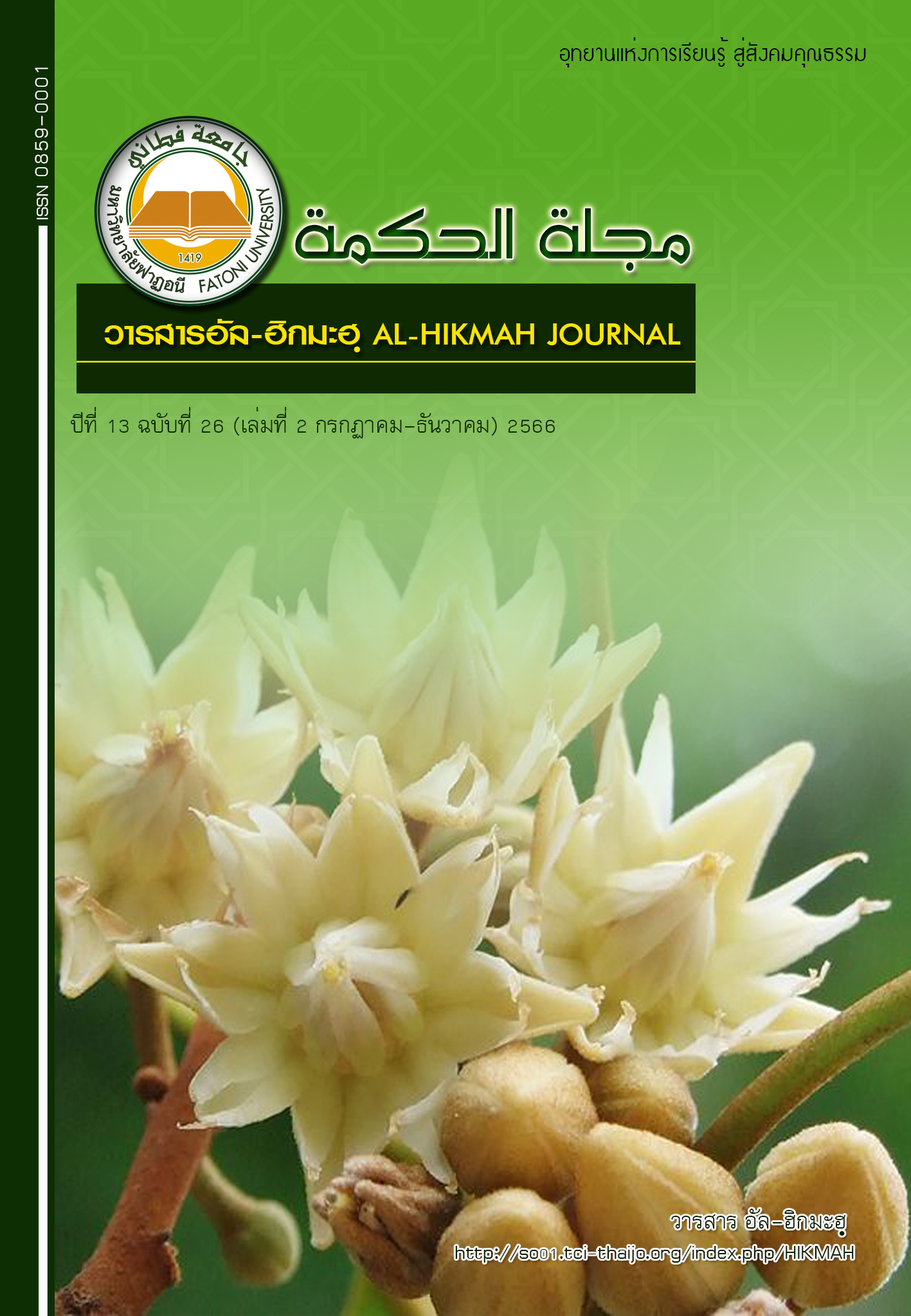The Comparative Study of Halal products Supporting Procession Between Thailand and Malaysia
Keywords:
The Comparative, Supporting Procession, Halal Products.Abstract
This research aims to study the Halal Products Supporting Procession of Thailand and Malaysia and the Comparative of Halal Products Supporting Procession Between Thailand and Malaysia. The study was collected data by records and interviews, the information was analyzed by creating conclusions.Then use the descriptive descriptive according to the objectives set forth. The result of the research found that:
Thailand emphasizes building confidence in correctness based on Islamic principles. By using mechanisms of religious organizations, legal mechanisms for religious affairs came to supervise the Halal business as the main. Along with the use of scientific inspection processes to support the Halal certification standards. Malaysia will focus on being a center for food production and Halal products to export to Muslim countries around the world according to the country's strategy. By using mechanisms of religious organizations, Commercial organization, Scientific and technological research organization, Educational organization, Halal Product Research Institute, Including legal mechanisms that facilitate trade Export and customs, Developing standards and supporting Halal strategies.
For the halal standard system of Thailand and Malaysia. The overall picture is consistent in terms of content. Only Malaysia will be outstanding and clear about the standard implementation. Have an efficient and comprehensive standard management system. Thailand has laws and regulations related to Halal businesses directly and indirectly are Islamic Organization Administration Act B.E. 2540, Industrial Product Standards Act B.E. 2511 and the National Agricultural and Food Products Act B.E. 2551. In Malaysia, there are more than 20 halal laws and regulations that are important, including Trade Details Act 2011, Food Act 1983, Food Regulations 1985, Food hygiene regulations 2009, Animal Act 1953 (revised 2006), Customs Act 1967. Local Administrative Organization Act 1976, State Islamic criminal law and the Consumer Protection Act 1999.
The certification process and the request for using Halal marks in Thailand and Malaysia in general are similar as preparation, submitting request and consideration, inspection of establishments, consideration of the examination results and the granting of certificates. As for the management of Halal business, Thailand will be organized in committee form under the supervision of the Central Islamic Council of Thailand. Which is independent in the operation of certifying halal standards, and has clearly specified the authority and duty. Different from Malaysia, which has the organizational structure according to the main line of work under the supervision of the Department of Islamic Development Malaysia (JAKIM). Which has the Halal Corporate Governance Department specifically. When comparing between the two countries, Malaysia will be outstanding in its organization management to be recognized internationally.
References
กนกวรรณ ขวัญดี และคณะ. 2016.อุปสรรคในการให้บริการโลจิสติกส์ฮาลาลของผู้ประกอบการโลจิ
สติกส์ไทย. Thai VCML Journal วารสารวิชาการ Thai VCML ปีที่ 9 ฉบับที่ 1 – มิถุนายน
โดยเครือข่ายนักวิจัยไทยด้านการจัดการโซ่คุณค่าและโลจิสติกส์
ปิยะพงศ์ เสนีย์, รัตนประยูร นิกร, ศิริวงศ์ ไพศาล และเสกสรร สุธรรมานนท์. 2559. กลยุทธ์การจัดการโซ่
อุปทานอุตสาหกรรมอาหารฮาลาลของไทย: กรณีศึกษาอุตสาหกรรมอาหารทะเล. บทความวิจัย
วารสารหาดใหญ่วิชาการ 14(1) ม.ค. - มิ.ย. 2559 มหาวิทยาลัยหาดใหญ่.
ยิ่งศักดิ์ บุญธรรม.2558. ฮาลาลโลจิสติกส์: ผลิตภัณฑ์อาหาร. วิทยานิพนธ์ตามหลักสูตรนิติศาสตรมหา
บัณฑิต สาขากฎหมายการค้าระหว่างประเทศ คณะนิติศาสตร์มหาวิทยาลัยธรรมศาสตร์.
สมเกียรติ ตรีรยาภิวัฒน์. 2549. กฎหมายอาหารฮาลาล. กรุงเทพฯ: มหาวิทยาลัยธรรมศาสตร์ .
อภิรดา งามวงศ์สกลเลิศ.2556. ความสัมพันธ์ระหว่างมาเลเซียกับองค์การการประชุมอิสลาม 1969 –
กรุงเทพมหานคร: จุฬาลงกรณ์มหาวิทยาลัย.
Abu Dardak, R. 2015. Transformation of Agricultural Sector in Malaysia Through
Agricultural Policies. Seminar Food and Fertilizer Technology Center (FFTC) for
the ASEAN and Pacific Region. International Seminar on Improving Food Marketing
Efficiency – The Role of Agricultural Cooperatives
Harlida Abdul Wahab& Alias Azhar. 2014. HalalanTayyiban dalam Kerangka
Perundangan Malaysia. KANUN. 1:103-120
JAKIM, 2014 Pekeliling Pensiilan Halal Malaysia Bilangan 2 Tahun 2014. Perlaksanaan
Manual ProsedurPensijilan Halal Malaysia 2014 (Semakan Ketiga). Putrajaya,
JAKIM.
Majid, M. A. A., Abidin, I. H. Z., Majid, H. A. M. A. &Chik, C. T., 2015. Issues of Halal Food
Implementation 837 in Malaysia. Journal of Applied Environmental and
Biological Sciences, 5(6S), pp. 50-56.
Mustafa ‘ Afifi AbHalim & Azlin Alisa Ahmad. 2014. Enforcement of Consumer Protection
Laws on Halal Products: Malaysian Experience. Asian Social Science.10(3):9-14.
Ngah, Abdul Hafaz, Yuserri Zainuddin, and RamayahThurasamy. 2013. 'Adoption of Halal
Supply Chain among Malaysian Halal Manufacturers: An Exploratory Study'.
Procedia - Social and Behavioral Sciences 129 (2014): 388-395.
Ngah, Abdul Hafaz, Yuserri Zainuddin, and Ramayah Thurasamy. 2014. 'Barriers and
Enablers In Adopting Halal Transportation Services: A Study Of Malaysian
Halal Manufacturers'. International Journal of Business and Management 2 (2014)
Norazilawati MdDahlal. 2015. Pengurusan Kualiti Makanan Halal. Dewan Bahasadan
Pustaka. Kuala Lumpur.
Norazla Abdul Wahab.2015.Undang-undang Halal Malaysia: Isudan Cabaran.
https://www.researchgate.net/publication/286920615.
Othman, P., Sungkar, I., &Hussin, W. S. W. (2009). Malaysia as an International Halal Food
Hub. ASEAN Economic Bulletin,26(3), 306-320.
Wan, N. Z. N., Bakar, R. A., Razak, S., & San, S. 2014. The Importance of Halal to Muslim
Consumers: Are They Powerful Stakeholders. J. Appl. Environ. Biol. Sci, 4(6S),
Zulkifli Hassan.2007. Undang-undang Produk Halal di Malaysia: Isu Penguatkuasaan
dan Pendakwaan. Konvensyen Kebangsaan Undang-undang: Isu Penguatkuasaan
dan Pendakwaan. 11-12 Ogos 2007.
Zulfakar, Mohd Hafiz, Marhani Mohamed Anuar, and Mohamed Syazwan AbTalib. 2012.
'Conceptual Framework on Halal Food Supply Chain Integrity Enhancement'.
Procedia - Social and Behavioral Sciences 121 (2014): 58-67.
Downloads
Published
How to Cite
Issue
Section
License
Copyright (c) 2023 Al-HIKMAH Journal

This work is licensed under a Creative Commons Attribution-NonCommercial-NoDerivatives 4.0 International License.



